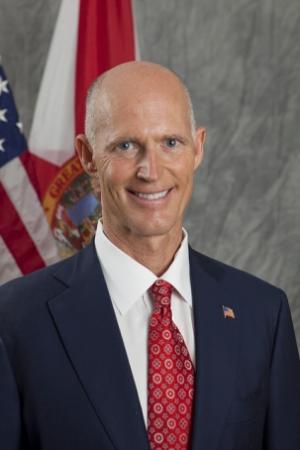Florida's Republican Gov. Rick Scott thinks he can make state employees pee in a cup for him with the stroke of a pen. The ACLU of Florida disagrees and is suing him in federal court.
"The Power of the Poppy: Harnessing Nature's Most Dangerous Plant Ally" is reviewed and found most interesting.
Legalization is an important battle to fight for the country, but victory is not a foregone conclusion. Which way things go depends on the actions that YOU take at this point in time -- the future depends on you.
California NORML's Dale Gieringer crunches the numbers and finds a whole lot of medical marijuana patients in the Golden State.
Under a Florida law signed by Gov. Rick Scott Tuesday, welfare recipients must undergo drug tests. It looks like the ACLU will challenge it in court.
Drug testing mania has arrived at the Chicago Housing Authority, which is now proposing to require drug tests of all adult residents, with evictions if they fail.
More narcs get rowdy at a narc convention and a pair of cops who couldn't keep their paws off the pills.
No end in sight for the prohibition-related violence plaguing Mexico. The hit men just keep on coming.
Police found no drugs in the home of a veteran they shot and killed in a May 5 drug raid in Tucson.
Iran has already executed more than 125 people for drug trafficking so far this year, and more than 300 await the hangman. It claims that's the only way to stop the flow of drugs destined for Europe.
If you want to experience the cannabis coffee shops of Amsterdam, book your ticket now. Next year will be too late, as Holland gives the finger to pot-loving visitors.
Events and quotes of note from this week's drug policy events of years past.
The ACLU of Florida Tuesday filed suit in federal court in Miami to block Gov. Rick Scott's (R) executive order mandating random, suspicionless drug testing of state employees. The lawsuit contends the drug testing amounts to an unlawful and unreasonable search and seizure, violating state employees' Fourth Amendment rights, and seeks an immediate halt to the practice.

Florida state workers, be prepared to submit one of these if Gov. Scott has his way. (Image via Wikimedia.org)
"We are taking this action to prevent Gov. Scott from trampling on your rights in Florida," said ACLU of Florida head Howard Simon during a Wednesday afternoon press call. "We don't have a system of government run only by the executive and the legislative branch. It's time for the courts to step up and defend the rights of Floridians. This is an abuse of government power."
The lawsuit was brought on behalf of the American Federation of State, County, and Municipal Employees (AFSCME) Council 79, which represents 50,000 state employees and an additional 200,000 county and municipal employees in Florida. Also joining the lawsuit is Florida Fish and Wildlife Conservation Commission research scientist Richard Flamm.
"AFSCME has for decades supported drug-free workplace policies while preserving the fundamental right of public servants to be free of extreme governmental intrusions," said Alma Gonzales, general counsel for AFSCME Council 79. "We negotiated objective standards for drug testing for reasonable suspicion or if there is a safety risk, but at no point has the governor's office ever contacted us to negotiate over this. We're talking about taking their bodily fluids without probable cause or consent," she pointed out. "It's surprising and disappointing that the chief executive of Florida is unaware or doesn't care that this is the law of the land."
"I've been a state employee for almost 18 years," said Flamm. "There is absolutely no suspicion based on my behavior at work that I am a drug user. I joined as a plaintiff in this lawsuit because I find this extremely costly and wasteful. There is no threat to society. As a Florida taxpayer, I find it outrageous that given our current economic climate, with the loss of services and public jobs, that we would be wasting millions with unnecessary drug tests. As a citizen of the United States, I find this executive order an egregious attack on the Constitution. I'm surprised more people haven't stepped up," the research scientist said.
Scott signed the executive order on March 22, and it called for state agencies to have devised drug testing regimes by May 21, but it is unclear whether any state employees have been subjected to drug testing at this point.
The US Supreme Court has held that suspicionless drug testing by the government is an unreasonable search under the Fourth Amendment. The only exceptions allowed by the high court are "special circumstances," such as employees who work in jobs where there is "concrete danger of real harm."
"This executive order is profoundly un-American," said Simon. "This is a governor who masquerades as a conservative, but who is a radical. We had a revolution in this country that led to the enactment of the Fourth Amendment and the bill of rights, and that was a reaction to warrantless searches by the troops of King George."
"When we were asked to look at this and represent AFSCME, we did a painstaking analysis of constitutional law precedents dealing with employee drug testing," said Peter Walsh, an ACLU of Florida attorney working on the case. "This isn't a case of a governor arguably acting within the bounds of the US Constitution or even pushing the envelope to test the limits; the governor has ripped the envelope apart and jumped way over the line of what is permissible. He has violated the Fourth Amendment's search and seizure clause and done so in a big way."
There is also precedent from the Sunshine State itself. The city of Hollywood, Florida, enacted a municipal employee drug testing law little more than a decade ago, only to have it thrown out by the Florida courts in 2000. Four years later, the state Department of Juvenile Justice's effort to conduct suspicionless drug tests on employees was also thrown out. The department is a state agency covered by the governor's executive order.
"I'm not surprised but a little bit shocked that the governor would go ahead with issuing an executive order when this is about as close to settled law as possible," said Simon. "Federal judges have struck such programs down as searches without probable cause and without reasonable suspicion."
"Employee drug testing by urinalysis is particularly destructive of privacy, offensive to personal dignity, demeaning and an affront to dignity," said Walsh. "Those are the words of Justice Antonin Scalia from his dissenting opinion in a seminal case on employee drug testing."
In that case, the high court upheld suspicionless drug testing by private employers. US law provides few worker protections from employer drug testing. But drug testing by the government is a different matter, and constitutional protections unavailable to private sector workers come into play.
"People say this is so widespread in the private sector that what's the big deal," said Simon. "But just because it's widespread doesn't make it right. Public sector employees are protected by the Fourth Amendment; they have more protection of their rights to privacy. We are proud to be filing this lawsuit on their behalf."
Simon also hinted strongly that the ACLU of Florida would soon be filing another lawsuit, this one aimed at
the welfare drug testing bill Gov. Scott signed this week. Like state worker drug testing, the courts have frowned on the suspicionless drug testing of welfare recipients. The last state to try to implement such a plan, Michigan, had its law thrown out as unconstitutional by a US district court in 2003.
Gov. Scott ran on a platform of reducing needless spending in the public sector. But he's about to spend big bucks on defending an executive order that is constitutionally indefensible and likely to spend even more defending the welfare drug testing law that is just as constitutionally indefensible.
back to top
The Power of the Poppy: Harnessing Nature's Most Dangerous Plant Ally, by Kenaz Filan (2011, Park Street Press, 312 pp, $18.95 PB)
Kenaz Filan thinks that Poppy (always capitalized in the book) is a sentient being. Before you roll your eyes as you recall the fervent mushroom cultists who say the same sort of thing, recall also that more mainstream authors, such as foodie Michael Pollan, have been known to talk like that, too, posing similar questions about what plants want. I'm not personally convinced about the sentience of plants, but I find that adherents of such a position definitely bring something of value to the table: respect for their subjects.
The opium poppy certainly deserves our respect. It can bring miraculous surcease from suffering through the pain-relieving alkaloids within, but those same alkaloids can also bring addiction, oblivion, and death. Our "most dangerous plant ally" can be both kindness and curse, boon and bane. Only by respecting Poppy, writes Filan, can we learn how best to manage our relationship with her.
The Power of the Poppy is part historical treatment, part cultural essay, part pharmacopeia, part practical guide. As such, positions on plant consciousness notwithstanding, it's a fascinating and illuminating treatment of the poppy and its derivatives. Filan traces the history of man's relationship with poppy from 6,000-year-old archeological digs in Europe, through early uses in the Roman empire and the Islamic world, and on to the current era of the war on drugs.
While Filan addresses the war on drugs and finds it stupid, this is not mainly a book about drug policy, and he dismisses the issue in short order. "Our war on drugs has been a one-sided rout," he writes in the introduction. "We keep saying 'no' to drugs, but they refuse to listen."
In his few pages devoted to the past century of opium prohibition, he reiterates the futility of trying to stamp out poppy even as its cultivation spreads. "Poppy is happy to fulfill our needs as long as we propagate her species," he writes. "To her, our 'war' is like locust invasions and droughts -- an annoyance, but hardly something that will endanger the continued existence of her children."
From there, Filan turns to the chemistry and pharmacology of opium and its derivatives and synthetics. He traces the isolation of morphine, codeine, heroin, thebaine (from which is derived hydromorphone [Dilaudid], oxymorphone [Opana], hydrocodone [Vicodin], and oxycodone [Oxycontin]),
kompot (East European homebrew heroin), methadone, and fentanyl. Along the way, Filan touches on such topics as the lack of pain-relieving poppy products in the developing world, the development of Oxycontin and the rapid spread of "hillbilly heroin," and controversies over needle exchanges, safe injection sites, and methadone maintenance therapies.
In nearly every case of the development of a new opiate or opioid drug, researchers were hoping to find a substance that maintains poppy's analgesic qualities while eliminating or at least reducing its addictive ones. No such luck. "Despite the best efforts of our chemical minds," Filan writes, "Poppy still demands her bargain…Even as we go to war with Poppy, we are forced to do business with her."
In his next section, demonstrates the bargain poppy extracts as he profiles 11 famous users, including
Confessions of an Opium Eater author Thomas de Quincy, Samuel Taylor Coleridge, William Burroughs, Lou Reed (whose Velvet Underground-era
Heroin and
Waiting for My Man put the 1960s New York junkie experience to music), and DJ Screw, whom I must confess I never heard of until reading
The Power of the Poppy. Mr. Screw, whose real name, it turns out, was Robert Earl Davis, was a Houston DJ who rose to hip-hop fame after smoking Mexican weed and accidentally hitting the pitch button as he mixed tapes. The ensuing distorted vocals and slowed down beats became known as "screwed down" and Davis picked up the moniker DJ Screw.
Among the favorite topics of Screw and his crew was "purple drank," a concoction of soda pop, codeine cough syrup, and Jolly Ranchers candy, that created a warm, relaxed high. Screwed down music was the perfect accompaniment for a drank-fueled evening. While DJ Screw died young, in part because of his fondness for drank, he was also an overweight, fried-food loving smoker. While drank may have helped make DJ Screw, as always, poppy exacted her part of the bargain.
In the final segment of the book, Filan gets practical. He describes how to grow your own (from
papaver somniferum seeds widely available at gardening stores) and how to extract the raw opium. He describes poppy tea brewing recipes, as well as how to use poppy in pill, tablet, or capsule form; as well as eating smoking, snorting, and shooting it. And he doesn't stint on explaining the dangerous path one is on when one embraces the poppy. Although I don't recall Filan ever using the words harm reduction, he is all about it as he cautions about overdose, dependency, and addiction.
The Power of the Poppy elucidates the many ways the histories of man and poppy are intertwined, and it's full of interesting tidbits along the way. Who knew that the use of "dope" to mean drugs came from Dutch sailors mixing opium and tobacco off China in the 17
th Century? They called the mixture "doep," like a greasy stew they ate. Or that calling seedy establishments "dives" derived from scandalized descriptions of California opium dens, with the patrons reclining on divans? Or that the scientific name for snorting is "insufflation"?
If you have an interest in opium and its role in human affairs,
The Power of the Poppy will be both entertaining and enlightening. And -- who knows? -- maybe you'll start treating that plant and its derivatives with the respect they deserve.
back to top

Dear Drug War Chronicle Reader:
Drug policy reform faces challenges and opportunities.
- States continue to enact medical marijuana laws, most recently Delaware, the 16th medical marijuana state; Vermont, a new medical marijuana dispensary state; and Maryland, with a new necessity defense bill that will study medical marijuana dispensaries.
- Nationwide support for legalizing marijuana is nearing 50 percent, and Congress will take up a legalization bill this year.
- States including Georgia, Oklahoma, Florida, Kentucky, Delaware, Ohio and many others are reducing drug sentences or considering it.
But the forces of prohibition aren't sitting still.
Please take a moment to support our organization with a generous donation. Your support will enable us to continue our publishing that informs, supports and builds the movement; to continue and expand our work with coalitions lobbying for drug policy reform, sentencing reform and ending collateral consequences of drug convictions; and to put plans in place supporting marijuana legalization initiatives coming up in as many as four states.
It is no exaggeration to say that the future depends on you. As Congressman Jared Polis told reformers at a recent gathering, this is an important battle to fight for the country, but victory is not a foregone conclusion: Which way things will go depends on the actions that you take today.
Thank you for supporting our organization and joining our call to end the failed and unjust drug war.
Sincerely,

David Borden, Executive Director
StoptheDrugWar.org
P.O. Box 18402, Washington, DC 20036
http://stopthedrugwar.org
P.S. We continue to offer a range of books, videos and other gift items as our thanks for your donations. See our online donation form for a current listing.
back to top
In an analysis released Tuesday, California NORML estimated that the number of medical marijuana patients in the Golden State is at least 750,000 and could be as high as 1,125,000. Those figures represent 2% and 3% of the state's population, respectively.

medical marijuana containers with vaporizer (image via Wikimedia.org)
In earlier analyses, California NORML had estimated the number of patients at 75,000 in 2004, 150,000 in 2005, and 300,000 in 2007.
Because patients are not required to register with the state, nobody knows for sure what the real number is. California NORML arrived at its estimate by looking at registration rates in other medical marijuana states that have similar wide access to medical marijuana clinics and dispensaries, most notably Colorado and Montana.
In Colorado, 2.5% of the state population is on the medical marijuana registry, while in Montana, the figure is 3%. Other registry states have lower percentages, but those can be attributed to the lack of dispensaries, limits on dispensaries, or, in the case of Michigan, the relative newness of the program.
In accepting a figure in the 2.5-3% range, California NORML is being cautious. California's medical marijuana law has been in effect for longer than those states and it is the most inclusive, allowing a recommendation to be issued for virtually any reason.
Despite the high number of medical marijuana users, there is no evidence that easy access to medical marijuana has spurred pot use in California, the group argued, citing federal and state government surveys. California is only slightly above the national average for past month or past year use and use among teenagers has actually declined, California NORML pointed out.
Based on the population estimates, per patient consumption of between one-half and one gram a day, and an average price of $320 an ounce, the group estimated the total retail value of medical marijuana consumed in the state each year at between $1.5 billion and $4.5 billion.
"The data show that medical marijuana users are becoming an increasingly important constituency," said California NORML Director Dale Gieringer. "It is time for the federal government to stop ignoring the facts and recognize their right to medicine."
back to top
Florida welfare applicants and recipients, mostly women with children, will now have to undergo drug tests at their own expense to receive cash benefits after Gov. Rick Scott (R) signed into law a drug testing bill, HB 353, that passed the state legislature earlier this month. Scott also signed HB 1039, a law banning "bath salts," or new synthetic stimulant drugs.

Gov. Rick Scott (R) scores political points on the backs of the poor. (Image courtesy state of Florida)
More than 21,000 Floridians receiving benefits as heads of households will have to pay for and take the drug tests, as well as any new applicants. If they pass the drug test, they will be reimbursed for the cost. If they fail the drug test, they become ineligible to receive benefits for one year or until successfully completing drug treatment. Children of heads of household who test positive would still be eligible to receive benefits through a designated third party.
Scott and the Republican-controlled legislature argued that the law is necessary to stop welfare recipients from using the money to buy drugs. But opponents cited studies demonstrating that drug use is no more common among welfare recipients than among the general public.
"While there are certainly legitimate needs for public assistance, it is unfair for Florida taxpayers to subsidize drug addiction," Scott said in a
press release. "This new law will encourage personal accountability and will help to prevent the misuse of tax dollars."
The ACLU of Florida was quick to attack the new law. It noted that the only other state law mandating suspicionless drug testing of welfare recipients -- one in Michigan -- was overturned by the federal courts in 2003 for violating the Fourth Amendment's proscription against unwarranted searches and seizures.
"Once again, this governor has demonstrated his dismissal of both the law and the right of Floridians to personal privacy by signing into law a bill that treats those who have lost their jobs like suspected criminals," said ACLU of Florida head Howard Simon in a
statement Tuesday. "The wasteful program created by this law subjects Floridians who are impacted by the economic downturn, as well as their families, to a humiliating search of their urine and body fluids without cause or even suspicion of drug abuse."
Citing the Michigan decision, Simon continued: "Surely the governor knew this, and the ACLU testified in the legislature that the bill was a significant and unnecessary invasion of privacy. The new law rests on an ugly stereotype that was disproven by the state's own earlier experimental drug-testing program," he said. "Nevertheless, their zeal to score political points on the backs of Florida's poor once again overrode their duty to uphold the Constitution. Searching the bodily fluids of those in need of assistance is a scientifically, fiscally, and constitutionally unsound policy. Today, that unsound policy is Florida law."
Wednesday the ACLU of Florida announced it was filing suit against the governor over an executive order he issued earlier this year requiring suspicionless drug testing of state employees. At the same time, it promises an announcement soon about how it plans to respond to the welfare drug testing law.
back to top
The Chicago Housing Authority wants to require all current and future adult residents -- including senior citizens -- to pass a drug test. A positive drug test would result in an eviction notice for the resident.

The CHA wants you to pass a drug test if you live in the Kenmore or any other CHA properties. (Image courtesy CHA)
The proposal is one of several changes to the CHA's Admission and Continued Occupancy Policy submitted by CEO Lewis Jordan. Jordan and other agency officials argue they need more tools to fight crime and drugs in the housing projects.
The American Civil Liberties Union accused the CHA of subjecting the poor to a double standard, while resident leaders said the proposal was humiliating.
"The ACLU opposes drug testing in the absence of suspicion as a condition of residency in public housing," senior lawyer Adam Schwartz told the
Chicago Sun-Times. "From our perspective, drug testing without suspicion is humiliating. It's stigmatizing. There's a double standard here," he said. "All across our city and our country, when most of us who are in whatever income bracket rent housing, we don't have to take a drug test. This is an emerging one standard for poor people and another standard for everyone else."
"Singling us out for this type of humiliation is a slap in the face of what this whole 'Plan for Transformation' supposedly is about," Myra King, chair of the central advisory council of tenant leaders for all CHA housing in the city, told the Sun-Times. "CHA says they're doing this plan to make us privy to the same standards as any other citizen in any other community. If that's true, why are we the only citizens to be drug tested?"
Lewis's "Plan for Transformation" also includes eliminating the "innocent tenant defense," which allows residents whose relatives or guests committed a drug offense or crime of violence to avoid eviction if they can show they were unaware of the activity. In a 2002 case, the US Supreme Court ruled that housing authorities could evict innocent tenants, but they are not required to. Former CHA head Terry Peterson had reached an agreement with tenants that allowed the continued use of the defense if it could be proved in court.
Spokeswoman Kellie O'Connell-Miller defended the proposals, pointing out that several CHA mixed-income properties currently require drug testing. "These are policies to help strengthen and improve the safety of our public housing communities," O'Connell-Miller said. "We're constantly hearing from law-abiding residents that they want us to hold the non-law abiding residents more accountable. We're trying to tighten up our lease with some of these issues. Drug dealers won't come where there are no buyers. If you remove the folks who are interested in drugs, hopefully it will remove some of the problems," she said.
Making the policy system wide would apply it to some 16,000 families living in family and senior public housing. The CHA has not estimated the cost of the proposal, O'Connell-Miller said.
The proposals are open to public comment through June 16, with a public hearing set for Thursday. If the proposal is adopted, it must then be approved by the CHA Board and then the federal Department of Housing and Urban Development.
And then the CHA can spend good money fighting (and most likely losing), the inevitable legal challenges. The precedent here is the state of Michigan's 1990s law mandating the suspicionless drug testing of welfare recipients. It was rejected by the federal courts in 2003 for violating Fourth Amendment proscriptions against unreasonable search and seizure.
back to top
Narcs get rowdy at a narc convention and a pair of cops who couldn't keep their paws off the pills. Let's get to it:
In Hyannis, Massachusetts,
a group of men attending the New England Narcotics Officers Association is accused by a Cape Cod DJ of twice attacking him at a bar after he tried to non-violently intervene on behalf of a woman being harassed by one of them. The narcs were in town for a convention. Duane Alves, better known as DJ Alvzie filed a report with Barnstable Police after the incident in which he said one of the men dumped a drink on his head, then punched him. The man's comrades joined in the beating. Alves also said that the men then blocked the exits from the bar and attacked him again when he tried to leave. The second attack resulted in serious injuries, including broken bones around his right eye and a damaged nasal cavity. Alves managed to grab a cell phone of his attackers dropped, and Barnstable Police confirmed it belonged to someone who attended the narc-fest, but would not identify the owner. Barnstable Police continue to investigate.
In Napoleonville, Louisiana,
a former Assumption Parish sheriff's deputy pleaded guilty May 24 to a whopping 438 malfeasance and drug charges for using seized drugs to feed his own habits. Louis Lambert, 48, had been the evidence room technician for seven years when deputies discovered missing drug case evidence in April 2010. Lambert was arrested in June 2010 and fired and indicted in October. He copped to 336 counts of malfeasance for evidence tampering, 35 counts of pot possession, 24 counts of cocaine possession, 11 counts of prescription drug possession, one count of Oxycodone possession, one count of steroid possession, once count of Alprazolam possession,10 counts of drug paraphernalia possession, 14 counts of possessing a firearm while in possession of illegal drugs, four counts of firearms theft and one count of theft under $300. Charges against about 20 drug suspects had to be dropped because of the missing evidence. He faces up to 1400 years in prison when sentenced July 6.
In Yorkville, Illinois,
the Yorkville Police deputy chief was arrested last Friday on charges he stole pain relieving pills from the department's drug collection program. Deputy Chief Dave Delaney is charged with possession of hydrocodone and theft of government property. Yorkville Police had become suspicious that some of the drugs turned in were missing and contacted the Illinois State Police, who conducted a week-long investigation. They marked some of the hydrocodone pills, then confronted Delaney and found he had several on him. He faces up to three years in prison on each count.
back to top
by Bernd Debusmann, Jr.
Mexican drug trafficking organizations make billions each year smuggling drugs into the United States, profiting enormously from the prohibitionist drug policies of the US government. Since Mexican president Felipe Calderon took office in December 2006 and called the armed forces into the fight against the so-called cartels, prohibition-related violence has killed more than 38,000 people, including more than 15,000 last year. The increasing militarization of the drug war and the arrest or killing of dozens of high-profile drug traffickers have failed to stem the flow of drugs -- or the violence -- whatsoever. The Merida initiative, which provides $1.4 billion over three years for the US to assist the Mexican government with training, equipment and intelligence, has so far failed to make a difference. Here are a few of the latest developments in Mexico's drug war:

Drug prohibition funds the bloody mayhem in Mexico (Image via Wikimedia.org)
In Nayarit,
29 people were killed during ferocious clashes between rival groups. Of the dead, 17 were found stacked in the bed of a pick-up truck. Many of the dead were wearing military-style ballistic vests and dark clothing. In the past, much of the fighting in Nayarit has been between El Chapo Guzman's Sinaloa Cartel and the Zetas.
In Michoacan, over 1,800 people fled the village of Buenavista because of heavy fighting between the Mexican military and gunmen from an unknown cartel.
Saturday, May 25
In Texas,
a Bexar County sheriff’s sergeant was killed by a gunman who opened fire on his patrol car with an automatic weapon, possibly an AK-47 similar to those favored by Mexican cartel gunmen. The incident is being investigated as possibly being connected with Mexican criminal organizations.
In Apatzingan, Michoacan, a
Mexican Air Force MD530 helicopter crashed during operations against drug traffickers. It was originally reported the helicopter had crashed after being struck by gunfire, but the Mexican military has denied this.
In Acapulco,
five gunmen were killed in a fire fight with members of the municipal police.
Sunday, May 26
In Saltillo, Coahuila, the offices of Vanguardia newspaper were attacked with a hand grenade. Nobody was injured in the attack, which appears to have been intended to intimidate the local media. In January 2010, Valentin Valdes, a local reporter, was executed after being kidnapped by two trucks full of gunmen.
In Ciudad Juarez,
nine people were murdered. Among the dead was a female who worked for the police department who was shot at a gas station. Four others were wounded, including the victim's mother and sister.
Monday, May 30
In Ciudad Juarez,
a girl of six years old was among five people who were murdered. The girl died in the hospital after being shot when a Jeep Cherokee pulled alongside her family's car and opened fire. Some reports indicate that a federal police patrol car was in front of the vehicle, but that they somehow didn’t notice the attack.
Tuesday, May 31
In Pachuca, Hidalgo,
Mexican police arrested 25 people for being members of or helping the Zetas. Among those detained are 10 police officers, including a police chief and two senior officers. The arrests were made after suspects detained on Sunday in the nearby mountains told police that they received protection from the police chief and some members of his command.
In Manzanillo,
54 tons of meth precursor chemicals were found in shipping containers which had come from China. Manzanillo is a major port of entry for precursor chemicals from Asia which are then taken to large-scale meth labs for meth production.
Wednesday, June 1
In El Salvador,
the country's defense minister said that Mexican cartels are attempting to buy assault rifles, grenades, and other military-grade weaponry from members of the security forces. Last week, Salvadoran NCO’s and four enlisted soldiers were arrested and stand accused of attempting to steal 1,812 grenades from a military facility.
Editor's Note: We cannot accurately tally the drug prohibition-related killings in Mexico at this time. El Universal, the only Mexican newspaper that was doing so on a regular basis, has stopped. We will have to rely on official pronouncements on the death toll, and will report them when they happen. Below are the numbers through the end of last year. With more than 1,400 reported dead in April alone, this year's toll could well exceed last years. As of this month, we believe the total death toll has surpassed 38,000.]
Total Body Count for 2010: 15,273
Total Body Count for 2009: (approx.) 9,600
Total Body Count for 2008 (approx.): 5,400
Total Body Count for 2007 (approx): 4,300
Total Body Count for Calderon's drug war through 2010: 34,883
back to top
No drugs were found in the home of a Tucson man shot and killed May 5 by a Pima County Sheriff's Office SWAT team, the Arizona Star reported Friday. Former Marine Jose Guerena, 26, was killed by SWAT team members after confronting them with a rifle in his hand as they broke into his home to serve a search warrant related to a complex drug investigation.

Jose Guerena survived two tours in Iraq, but not his encounter with a Pima County SWAT team.
Guerena's was one of four homes searched by SWAT teams in the investigation that day. Police said they found about $95,000 in cash, an unspecified amount of marijuana, and firearms during the raids, but nothing especially incriminating was found at Guerena's house.
Police said items seized at Guerena's house included a pistol, paperwork, tax returns, insurance papers, bank statements, and a bank card. They also found body armor in a hallway closet and US Border Patrol hat in the garage. Owning weapons, body armor, and Border Patrol hats is not illegal.
No arrests were made at any of the homes searched. Guerena had no criminal record.
Guerena's wife, Vanessa, and their four-year-old son were in the home when it was raided. Vanessa Guerena has said she saw armed men moving around her house and woke her husband, who was sleeping after working all night at his job in a mine. She and the child hid in a closet while Guerena went to confront the intruders.
Police originally said Guerena fired at officers before they returned fire. They had to revise that statement when it was revealed that the safety on Guerena's gun had not been switched off.
back to top
Three hundred people convicted of drug trafficking offenses are on death row in Iran, the Islamic Republic's judiciary said Monday. According to the anti-death penalty group Hands Off Cain, at least 126 people have already been hanged for drug offenses so far this year.

The hangman has been -- and will be -- getting a real work out in Iran. (Image via Wikimedia.org)
"For 300 drug-related convicts, including those who were in possession of at least 30 grams of heroin, execution verdicts have been issued," said Tehran prosecutor-general Abbas Jafari Dolatabadi, according to a
Reuters report.
An
annual British report on human rights put the number executed in Iran last year at more than 650, up from 388 in 2009. Of last year's executions, a whopping 590 were for drug trafficking, according to that report.
Members of the Iranian government have confirmed that drug executions make up a huge part of all executions, but added that if the West was unhappy with the killings, Iran could simply quit enforcing its drug laws.
"The number of executions in Iran is high because 74% of those executed are traffickers in large quantities of opium from Afghanistan bound for European markets," said Mohammad Javad Larijani, head of Iran's Supreme Council for Human Rights, during a
press conference in May.
That press conference came after a meeting with representatives of South Africa, which had criticized Iran's quick resort to the death penalty.
"There is an easy way for Iran and that is to close our eyes so drug traffickers can just pass through Iran to anywhere they want to go," he said."The number of executions in Iran would drop 74%. That would be very good for our reputation."
[Editor's note: That's actually not the worst idea.]
For information on ongoing efforts to curtail the use of the death penalty for drug offenses, visit the International Harm Reduction Association's
Death Penalty Project.
back to top
The Dutch cabinet announced last Friday that it is moving ahead with plans to effectively bar foreigners from the country's famous cannabis coffee shops. It plans to turn the coffee shops into private clubs limited to 1,500 members, who can only join if they are over 18 and can prove they are Dutch citizens or legal residents, according to Dutch News.

An Amsterdam cannabis coffee shop. If you want to check it out yourself, you better hurry. (Image via Wikimedia.org)
While the government must win approval from the Dutch Supreme Court for its ban on foreigners, it hopes to accomplish as much by limiting membership in the clubs. Proprietors will be forced to choose between local customers and foreign visitors.
The Netherlands has for more than 30 years tolerated the possession and sale of small amounts of marijuana, turning the country into a mecca for marijuana aficionados from around the world. But the conservative coalition government, tilted even further to the right after the last election by the addition of the far-right anti-immigrant party of politician Geert Wilders, is now tightening the screws in a bid to reduce drug tourism and what it says is crime and nuisance associated with the coffee shops.
"In order to tackle the nuisance and criminality associated with coffee shops and drug trafficking, the open-door policy of coffee shops will end," the Dutch health and justice ministers wrote in a letter to the country's parliament last Friday.
But officials in Amsterdam, home to 220 of the country's 500 or so cannabis cafes, said the proposals to turn the cafes into provide clubs would actually increase criminality and reduce public safety. The city council there opposes the move.
"We are concerned about the problems that will arise from large-scale street dealing," said a spokesman for Amsterdam Mayor Eberhard van der Laan. "There are also health concerns, because with street dealing we cannot monitor the quality of the soft drugs or the age of the buyers," he said.
But the government said it would increase policing and deepen its efforts to drive organized crime out of marijuana sales and production. While coffee houses can sell marijuana, the law makes no provision for their suppliers. The industry is estimated to be worth about $3 billion a year.
The plan will be rolled out in the border provinces of Limburg, Noord Brabant and Zeeland by the end of the year and the rest of the country next year, government officials said. Border towns such as Maastricht and Terneuzen have already restricted the sale of marijuana to foreigners, while other towns, including Roosendaal and Bergen op Zoom have gotten rid of the coffee shops altogether.
back to top
June 3, 1876: Fairgoers visit the Turkish Hashish Exposition at the Centennial Exposition in Philadelphia, where many partake.
June 8, 1993: Leading conservative intellectual William F. Buckley says in an interview, "the amount of money and of legal energy being given to prosecute hundreds of thousands of Americans who are caught with a few ounces of marijuana in their jeans simply makes no sense -- the kindest way to put it. A sterner way to put it is that it is an outrage, an imposition on basic civil liberties and on the reasonable expenditures of social energy."
June 4, 1998: Common Sense for Drug Policy begins a $60,000 advertisement campaign on CNN and other outlets, timed to coincide with the June 8 UN drug summit, featuring a video of President Clinton at the UN with an overdubbed voice imitating the president and urging a change in drug policy (with a visual disclaimer saying it is not Clinton talking). On June 7, ABC Evening News covers the story.
June 8, 1998: A well-publicized letter signed by more than 600 international leaders and high-profile, influential professionals from various fields is written to UN Secretary General Kofi Annan urging him to reconsider "failed and futile drug war policies" as the signers believe the war on drugs is now causing more harm than drug abuse itself. The signatories call for opening the debate to alternative approaches to drug abuse based on common sense, science, public health and human rights.
June 6, 2002: The newly formed medical marijuana advocacy organization Americans for Safe Access holds a nationwide day of action with protests at more than 50 DEA offices around the country.
June 7, 2003: Cheryl Miller, a multiple sclerosis patient and leading medical marijuana advocate, dies from pneumonia and other MS-related complications at 57 years old. She is survived by her husband, Jim, who remains active in the movement.
June 2, 2004: Judge Paul L. Friedman of the US District Court of the District of Columbia strikes down a law passed by Congress blocking marijuana law reform groups from purchasing ad space in public transit systems. Judge Friedman notes that the federal government cannot ban certain types of speech because it disapproves of their content -- especially in light of the government's own anti-marijuana advertising on the same buses.
back to top













